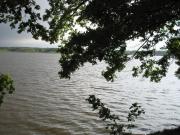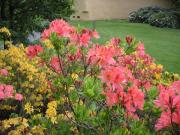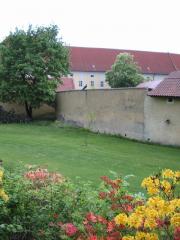Several hundred natural looking ponds dictate a visitor’s first impression of the South Bohemian, Trebon region. You can find ponds in the middle of villages, small like the palm of your hand, other ponds are much bigger, and some others look like natural lakes, bigger than anything you could imagine that medieval man could have made. However, all the ponds are just that, centuries old and man-made.
|
|
Over 600 years ago, settlers started plotting the locations for the first of the ponds. In the centuries that followed, many generations of fishery laborers and their families moved from location to location to dig these ponds and build the dams. Their clothes were often rags and, though the men may have swallowed many a drink, their able hands built all the ponds that you will come across in this region, from the smallest to the biggest. The outlook of this region was shaped by their hands.
The story told here and displayed in more detail on the display boards along the trail, tells the tale of their achievements and of the history and role of the man-made ponds in the Trebon Protected Landscape Area and UNESCO Biosphere Reserve.
When the early settlers arrived in the 12th century, this region was still covered in thick forests, cut through by brooks and rivers. In the flatter floodplains, deciduous trees alternated with bogs and marshes.
The Bishop of Olomouc describes a picture of how this region could well have looked at that time:
“… running water twists and turns with many oxbows. Near of them sit deep marshes and treacherous bogs from centuries past with their shifting surface where man can meet a certain death. One wrongly placed step was enough, what the bog swallowed it never returned...”
The settlers cut down more and more of the forests in their continuous quest for ever more space. The forests receded and the settlers started schemes to dry the very wet lands of the Trebon basin. With the help of small dams, the water flow was regulated to prevent inundation of the lands during high waters. The oldest known ponds were small drainage basins that formed behind these dams. The water from the resulting ponds was put to good use. It provided a reliable, year-round water supply for the farmers and their animals, it could be used to irrigate the lands and it powered many small work shops, such as blacksmiths, weaving shops, and lumber mills.
The water management also improved peoples’ health. By draining wetlands and regulating the water flow, illnesses associated with marshes and standing waters decreased markedly. In times of raging wars, the ponds and regulation ditches formed a protective barrier for the local population.
From the start, the ponds were also used as an additional food source. In the following centuries, the importance of fish production increased rapidly and the fish industry became an important factor in the region. The first written remarks about fish production in the Czech Lands originate from the 11th century. In the 14th century, the remarks about fish production were so numerous that we can speak of the first bloom period in fish pond construction. This was largely due to Charles IV, who granted permission to build the ponds and added: “build the fish ponds so our kingdom will be full of fish and water damp everywhere...” Religion also played an important role in this bloom in pond building, the Catholic Church stating that, on special days, meat was forbidden and only fish could be eaten.
At that time, there were numerous such special days! Fish production, however, had now become so large that part of the harvest was exported along the ‘fish road’ that ran from Pisek, through Trebon to the Austrian region of Vitoraz. Important progress in fish production was made at the beginning of the 15th century. Large ponds were constructed for fish production and the ponds were interconnected into production systems, encompassing several smaller and larger ponds. Pond building and carp production had become a common sight all over the Czech lands and the number of ponds surpassed 25,000!
|
|
| Favourite spots: |
 |
 |
 |
 |
 |
 |
 |
 |
View of the Rozmberk Fish Pond, Trebon.
 |
 |
One of the first, and by far the biggest and most complex, pond systems was constructed in the Trebon region, Netolicky A highlight of his work was the construction of the 48 km long Golden Channel, to regulate the filling and drainage of ponds away from the river.
His insights into fish production went beyond mere construction work and most of the systems and methods of his hand are, in their basic outline, still in use today. In the second half of the 16th centuries, fish farming became less important in most of the Czech lands but in the Trebon region construction of new pond systems continued.
The Thirty Year War (1618-1648) had a devastating effect on the country. Many people were killed and fish farming virtually came to a standstill. Besides this, the different armies destroyed many pond dams as part of their strategy. After the war, most of the former Rozmberk dominions came into the possession of the Schwarzenberg dynasty, which restored the ponds and fish production to their former glory.
Now, more than 600 years of careful water management and respect for nature have resulted in a unique man-made wetland. Through the centuries, the fish ponds have developed into semi-natural shallow lakes that are often indistinguishable from natural lakes. With the associated intricate web of regulation ditches, the river floodplains and the remaining bogs and marshes, the Reserve has become an important wetland with a high natural value. Despite ongoing economic activities, the Rozmberk pond and some of the adjacent ponds are now protected as nature reserves of the highest and second highest category.
|
|
| What's really great: |
 |
 |
 |
 |
 |
 |
 |
 |
Some nice gardens on the way to the Trails.
 |
 |
Walking along the Fish Trail was truly exciting. There were hundreds of old oak trees by the side of the ponds giving shade to the visitor. There is much breeze and nice country side too. The trail takes about 1 1/2 hours from end to end.
|
|
| Sights: |
 |
 |
 |
 |
 |
 |
 |
 |
Taken on the way to the Fish pond Trail
 |
 |
Rozmberk Pond - The Largest and Most beautiful of all the ponds.
Walk over to the Schwartzenberg Tomb and enjoy a day at this gem of a town.
|
|
| Restaurants: |
|
Visit the restaurant of Bily Konicek, Hlavni nam.
If you take a train from Vienna to Prague, it will stop at Trebon. Get off. Walk two-three blocks towards the town and get a room at the Siesta Pension.
Look to your right when you get to the canal. It's the green building about 4 doors to your right before you enter the city gates.
|
|
Published on Tuesday August 10th, 2004
|
|
 Publish on Facebook
Publish on Facebook
|
Fri, Apr 28 2006 - 11:57 PM
 by marianne
Farizan, This report is well-written. I suppose there is not so much to see here, we may not get here as it is on the way to Vienna and we will come from germany.
Marianne |
| Information: |
| Login if you are a member, or sign up for a free membership to rate this report and to earn globo points! |
|
| Australia |
|
|
 |
| Czech Republic |
|
|
|
|
|
|
 |
| Germany |
|
|
|
|
|
|
|
|
|
|
|
|
 |
| Malaysia |
|
|
|
|
|
|
|
|
|
|
|

|
